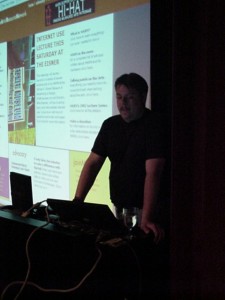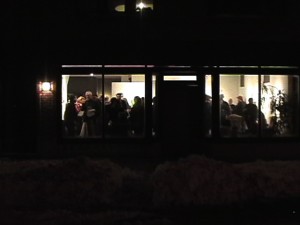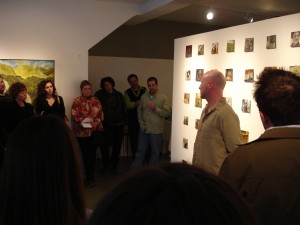From February of 2004 to August of 2008, I was the owner and curator of Hotcakes, but owning an art gallery was really just something I fell into.
I was living in this old furniture warehouse a couple miles southwest of downtown Milwaukee that had been converted into live/work space for artists. I was paying my bills by doing freelance web design for local nonprofits and friends who were trying to start up small businesses. I set up desks in my loft, so it looked more like an office than an apartment, but it was still awkward bringing clients into a space that had a queen-sized bed in it. For months, I kept thinking that if I had a dedicated studio, I would be able to hire some interns and expand my business.
I just didn’t have enough work to justify the extra expenses of even a small commercial lease. I was also Executive Director of the Milwaukee Artist Resource Network (MARN) at the time. MARN is a nonprofit arts-service organization I founded with five other artists in May of 2000 to provide business and educational resources for literary, performing, and visual artists. In the early years, the founders worked hard to bring together all the little cliques of artists around town, advocate for artist-friendly legislation, and be the one-stop shop for Milwaukee arts information. We held networking events, exhibitions, and professional development workshops around Milwaukee, but MARN was primarily known as an online resource because of the hundreds of artists that used our website and listserv everyday.
As Executive Director of MARN, I fielded a lot of phone calls and emails from artists new to the city who were looking to connect with the local arts community, or just looking for inside information on where to live and find cheap studio space. I would often tell them about a handful of events I planned to go to over the next couple weeks, and invite them to meet me there so I could introduce them to a bunch of other artists. Milwaukee’s arts community is like a big family now, but it can seem insular to newcomers. If someone isn’t brought in and made a part of the local arts scene within their first six months in a city, there seems to be little hope of them sticking around.
At the end of the summer of 2003, a painter who grew up in Milwaukee, went to art school on the East Coast, and moved back to town, emailed me with questions about the art community. I had Susie meet me at an art show in Riverwest, the in-transition neighborhood where most of the artists in Milwaukee live, and she told me about a 1300 sq. ft. storefront studio she found nearby for only $300 a month. When she asked if I knew anybody who was looking to share studio space, I jumped at the opportunity.
After a couple months of cleaning the place up, patching and painting walls, and trying to find a way to divert the water that poured through the ceiling every time it rained, we started talking about how cool it would be to have a one-night show of our friends’ art in the space. At first it sounded like a great idea… something fun… something easy, but the more we rehabbed the place, the more pressure I felt to make it look like a professional art gallery. How could I run an organization that helped artists take their careers more seriously and put on a half-assed show in my own space?
That’s when things started to spiral. I tore out the old lighting fixtures and bought some cheap track lighting. I came up with the name Hotcakes, designed a logo, and built a website. Susie and I were going to art shows in Milwaukee and Chicago trying to find an artist to feature, and before I knew it, we were sending out postcards for the grand opening of Milwaukee’s newest art gallery.
We had a great time putting together our first show, had an amazing turn-out, got a lot of press, and sold 27 paintings and 19 prints. We spent less than $1200 opening Hotcakes, and were excited about the future. Throwing a huge party for all our friends every month and featuring the work of artists we admired seemed like a great way to make a living, but the excitement was short-lived.
Hotcakes lost money on every show for the next year, and a few months after our first show, Susie wanted out. She never wanted to own an art gallery. She just wanted a studio space to make art in. Susie wanted to be an artist not an art dealer. I got us into this business, so when she left I wasn’t surprised, but I couldn’t let go of the business. I loved running Hotcakes. I loved having people come in six days a week and talking to them about art or whatever else was on their minds. I loved the big get-togethers of passionate, artistic people who were excited to share ideas and collaborate. I loved helping artists, and taking them to art fairs in Chicago and Miami. I loved everything about it. So for the next four and a half years, I gave Hotcakes everything I had.
Over the next two weeks while I’m guest blogging, I’ll be covering what it’s really like to own an art gallery, how to approach curators for shows, the dirty side of the art and nonprofit worlds, how to market on a shoestring, why a life-sized bronze statue of the Fonz was the last straw, and whatever tangents creep in. It’ll be a pretty cathartic process for me, and hopefully make for some interesting reading.







Pingback: How NOT to Approach a Curator | Art21 Blog
Pingback: 4150 – How NOT to Approach a Curator – reblog at feedback [ barry r. jones ]
Pingback: So what ARE curators looking for? | Art21 Blog